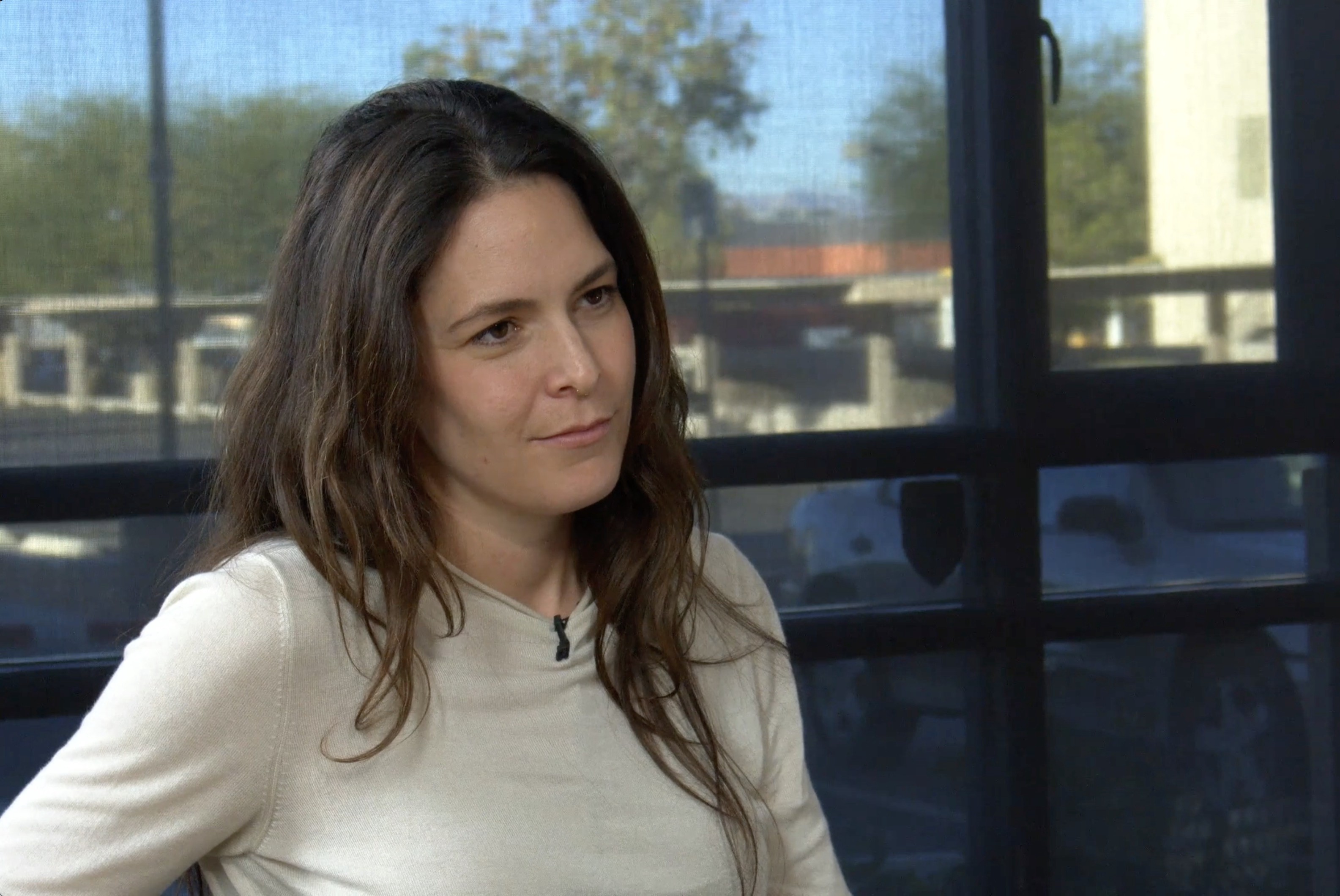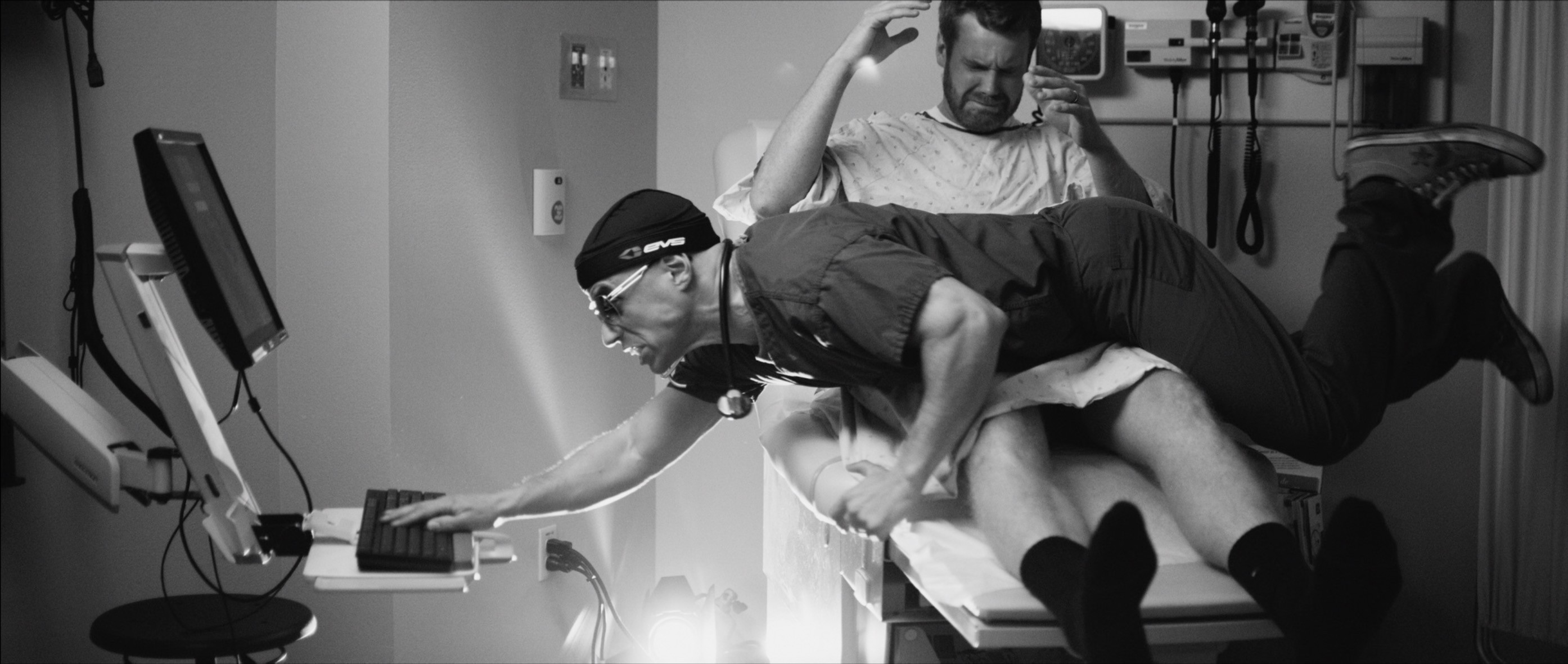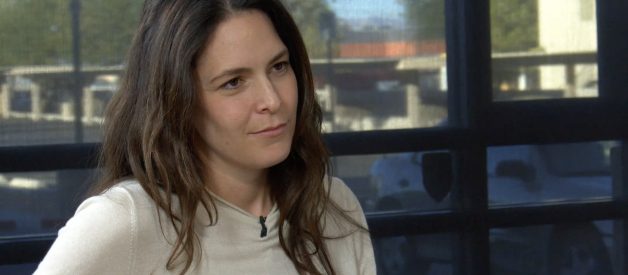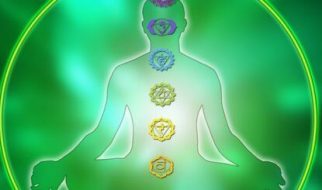 Britt Hermes, Former Naturopath and Current Badass. Watch the entire interview along with a complete transcript here.
Britt Hermes, Former Naturopath and Current Badass. Watch the entire interview along with a complete transcript here.
Meeting Britt Hermes for the first time, I?d never have pegged her for one of the most polarizing figures on the internetz. Friendly and poised despite severe jet lag and first trimester nausea, I worried that our upcoming live interview for Against Medical Advice might lack the requisite drama beyond the possibility of crowd-pleasing spontaneous projectile vomiting. But Britt?s blog, Naturopathic Diaries, had long been legendary in scientific circles for exposing the arcane and quackery-ridden world of naturopathy. After all, she had legit street cred as both a former naturopathic doctor and current actual scientist. Despite her exhaustion, she managed to open our eyes to the dangers of naturopathy while showing real vulnerability and insight around what attracted her to it in the first place. What can modern medicine learn from her journey?
Doctors Are Assholes
For those of us trained and deeply conditioned in the Western medical Matrix, it?s perplexing when patients choose to turn away from our legit science-based guidance. After all, we?ve busted our asses studying for countless hours, worked countless long nights, pushed our own lives aside, and become masters of delayed gratification to help people get well. Yet after all this sacrifice, our patients still have the audacity to turn towards dumb-ass celebrities and bullshit jibber-jabber like Goop. Worse still, they turn to those who call themselves ?doctor? without ever having gone through medical school or residency training. Why?
Britt?s story sheds a clear light on this question. Like many naturopaths, her path started as a conscious step away from conventional medicine triggered by a demoralizing experience with a physician. Hermes was 16 when she developed psoriasis:
I had giant red plaques all over my body. I went to see my mom?s dermatologist, and he didn?t have any time for me. He was really rushed and basically treated me like I was a little girl who was being vain about the situation. I was crying in his office, saying, ?Why do I have this condition? How can I get rid of it?? My mom has had psoriasis all her life, and she injects herself with drugs and doesn?t seem to get any better. I was terrified of this type of future for myself. I really needed someone to acknowledge what a difficult situation this was for me. But he was just basically an asshole to me. He said, ?There?s nothing I can really do for you except take these steroid creams. Here?s a script.?
Let me first say this, and I?m sure it?s gonna piss off some of my colleagues: dermatologists in particular deal with humans in especially vulnerable mindsets (our skin is what we show to the world, after all) and yet too many display some of the worst bedside manners I?ve ever encountered in medicine. Maybe this is due to their vulnerability to a payment model that creates severe time pressure by rewarding volume. After all, these same pressures have been wrecking the doctor-patient relationship across all specialities. I honestly don?t know, just a personal observation that will undoubtedly generate lots of hate mail for me.
Regardless, dismissed and dejected, Britt began to ?do her own research? on psoriasis. Note that this is the same language used by anti-vaccine moms and chemtrail lunatics, usually referring to a cherry-picked Google search that simply reinforces their confirmation bias. But Britt went to an actual library and found several natural medicine textbooks that taught about diet, lifestyle and anti-inflammatory supplements. As she instituted these changes in addition to using the steroids, her psoriasis ?miraculously? improved:
In my mind, my skin got better because of the alternative stuff that I was doing, and not because I was religiously applying the steroid cream. It was a very empowering experience for me because I felt like I had taken charge of my health. Over time I started to develop this sense that alternative medicine had answers for problems conventional medicine couldn?t treat.
And so a naturopath was born.
Becoming a Naturopath
Britt wanted to be a different kind of doctor than the awful sort she encountered, and the language (and marketing materials) of naturopathy spoke to this desire. Naturopathic schools advertise a rigorous curriculum in science-based ?natural? medicine and promote themselves as institutions that combine the best of modern and ?traditional? medicine. Set up to emulate medical school, students complete two years of pre-clinical course work followed by two years of clinical exposure, for a total of 4 years at a $45k annual price tag.
Courses in anatomy, physiology, histology, and biochemistry are mixed with alternative medicine ? homeopathy, herbal medicine, and botany along with an herbal ?wet lab? course on preparing herbal medicines (if you?re mentally conjuring Professor Sprout?s ?Herbology? class from the fictional Harry Potter series, join the club). Students then train in outpatient clinics run by naturopaths, seeing 1?2 patients during 3-hour blocks. There are two sets of naturopathic licensing exams, the first after completion of pre-clinical courses and the second after graduation. Ready to score your O.W.L., Doctor Weasley?
For Britt, this path to becoming a naturopathic doctor seemed less Potter parody than perfect path:
I would be pursuing a medical degree, plus all of this other natural stuff. I felt better than my medical colleagues. One of the things that naturopaths say and that really resonated with me is that I used medical texts to study in naturopathic school, because the medical texts are far better than the naturopathic texts? I twisted that to mean, ?Oh, because I can use a medical text to study for my naturopathic class, this must mean I?m receiving the same education.?
I didn?t understand that it wasn?t at the medical level or graduate school level, until I started to re-educate myself. I [later] went into a masters program and had to retake all these courses. [In order to] critically analyze my naturopathic education, I went through my syllabi and course descriptions and was doing credit comparisons with medical school, because I had been presented with all this information, but I wanted to know if it was real. What I came to find out is that while the naturopathic profession and the education system has some superficial markers of legitimacy, it?s actually just a bunch of labeling.?
Furthermore, while the bulk of learning to become a qualified, practicing medical doctor actually occurs after medical school ? during residency and sometimes fellowship training (which can take anywhere from 3?8+ additional years or 10,000+ hours) ? residencies are optional for naturopaths. Let me be clear, I graduated from UCSF medical school and after the 4 years of grueling study and clinical rotations, I was abjectly unqualified to lay a finger on a patient unsupervised without further residency training. Naturopaths, by contrast, can graduate and are allowed to practice independently as primary care providers in 20 states, the District of Columbia, and the US territories of Puerto Rico and the Virgin Islands. In some states, they can obtain a DEA number and prescribe medications. And they are advocating for licensure in more states and for even greater scope of practice.
The Dangers of Naturopathy
Even without these stark differences in the basic science and clinical training of naturopaths compared to medical doctors, the real danger of naturopathy lies in its belief in and promotion of pseudo-scientific therapies and patently false claims. Some naturopathic therapies are, at best, no better than placebo, and at worst, outright dangerous. There is no doubt that practitioners of naturopathy learn some science-based medicine. However naturopathy also emphasizes information that is non-science-based, instead rooted in pre-rational magical thinking. When this magical thinking is elevated to the same level as rational thought, eventually neither the practitioners nor the patients can tell the difference:
When you?re going through naturopathic school, we?re told that what we?re being taught is evidence-based or science-based. These are different things. Evidence-based doesn?t mean the same thing as science-based. Homeopathy is a really good example to try to differentiate these terms. You can find evidence, even randomized controlled trials, that make it look like homeopathy might work. You pull from that body of research. You cherry-pick those studies. Now you have an evidence-based therapy. Science-based means that it?s actually plausible. Homeopathy is not science-based. It?s nonsense. It breaks the laws of physics. It?s not plausible. The argument is that we should make sure something is science-based before we even move on to studying it. It should pass the science test first. [In naturopathy school,] I took one course in pharmacology with very superficial coverage of information. I took three courses in homeopathy, [which means that] I took three times as many classes in made-up medicine.
As a practicing naturopath, Britt saw patients in an outpatient clinic ranging in age from the very young to the very old, and she offered services such as screening, preventative medicine, and general wellness. However she also saw patients wanting second opinions on diagnoses and treatment plans recommended by medical doctors for diseases such as multiple sclerosis or cancer.
Britt?s reckoning with naturopathy would finally come when, under the medical orders of her former employer (a naturopathic doctor), she assisted in giving a drug called Ukrain to patients as a cancer treatment. Britt discovered that Ukrain was a non-FDA approved drug with unproven efficacy that was being illegally distributed from Austria. Importing and administering it was a federal crime. After filing a report with her state?s Naturopathic Physicians Medical Board (which simply reprimanded her employer), Britt learned that this practice was commonplace amongst naturopaths. The more she looked, the more she found her chosen profession to be rife with false and unethical behavior:
Naturopaths have treated teenage asthma patients with herbs and homeopathy and these patients have died. There?s been untreated bacterial meningitis in babies, and these babies have died. You have conditions like chickenpox becoming fatal and causing a sterilization, major problems. All of these common conditions get misdiagnosed and mistreated, and become very serious conditions when they were totally treatable with real medicine? And it?s costing the patient. It?s wasting the patient?s time and money. It?s potentially taking away real therapies for that patient and investing in magical thinking. Once you teach a patient that it?s okay and that they should be engaged in magical thinking, I think it?s a bit of a slippery slope. You go from using homeopathy for a self-resolving spider bite to then treating asthma to then treating something serious like cancer. It?s actually pretty easy to make that leap.
But at least naturopaths aren?t in Big Pharma?s pocket, right? You know, the same Big Pharma that could cure cancer but won?t because it?s more profitable to treat disease (at least according to the chemtrail crowd)? Consider that in the U.S. alone, the sales of herbal medicines, dietary supplements, and other ?natural? products have increased to $37 billion a year, and show no signs of slowing. Furthermore, unlike the pharmaceutical industry, the herbal and vitamin supplement industry is largely unregulated. The amount of active ingredient in a supplement can vary from pill to pill, and there are often ingredients that aren?t listed on the labels, some of which are harmful and have been banned by the FDA. Where is the outcry over Big Herbal?
Lessons For Modern Medicine
The reasons underlying the rise of naturopathy and other pseudoscientific alternatives can be traced directly to the failures of modern medicine. One need only look at the services advertised by naturopathic clinics to learn what these failures are: initial appointments of 90 minutes with followup appointments of up to 60 minutes; a ?holistic? approach that emphasizes prevention and wellness; individualized treatment plans based on patients? unique health goals and risks; nutrition and mental health counseling. Throw in acupuncture and the ancient mystique of East Asian medical traditions and the allure is hard to resist.
By contrast, what do many patients feel modern medicine offers? A shortage of primary care physicians in the U.S. means longer wait times and shorter appointments. Fifteen minute slots are the standard, and part of that precious time is spent on computer documentation and other bureaucratic functions increasingly demanded by medical practice. Doctors now make more eye contact with a computer than with patients.
 Must?finish?charting?
Must?finish?charting?
Modern medicine is also primarily focused on finding and treating disease, with less emphasis on maintaining or improving health and well-being. Nutrition and mental health counseling are too often after-thoughts in a busy medical practice. More and more, a one-size-fits-all ?evidence based? algorithm is applied to our patients with unique hopes, dreams, and stories?to their detriment. And with so many specialists and so few quarterbacks in the form of general practitioners, the care feels?and often actually becomes?woefully fragmented.
So what naturopaths primarily offer is time ? time for effective listening and communication; time to build a relationship and trust based on compassion; time to understand all the determinants of health for a particular patient and time to formulate a unique treatment plan. Forget that those treatment plans often include batteries of unnecessary laboratory tests, expensive supplements and unproven therapies; it feels right because the patient has been heard and acknowledged on a deep intuitive level.
Britt Hermes? fateful experience with her dermatologist highlights modern medicine?s failure to provide the connection and empowerment that patients seek. Time is key ? in a system that rewards volume and procedures, time is only worth what you can bill for it and there are no billing codes for ?building rapport?. We don?t get paid to show compassion, which is love and understanding in the face of suffering. The acknowledgement of this suffering and the incorporation of our patients? internal, subjective experience into their treatment plans ? even if there is little that can be ?done? medically ? is a shift in thinking that modern medicine must learn from the naturopaths.
For Britt, this failure to acknowledge suffering is one reason why women in particular are drawn to naturopathy:
Medicine does a really shitty job of taking care of women. I think it?s really common for women to feel like they?re not heard, to feel like they are belittled, to feel like they are making their symptoms up. They come in complaining of uterine cramping or fatigue or PMS symptoms and it?s brushed off as exaggerated symptoms or, ?Just take an ibuprofen and get over it.?
Maybe it?s time that we in modern medicine ?did our own research? and listened to what the allure of naturopathy is telling us. We need to rehumanize and re-personalize science-based medicine. We need to honor and better utilize the mind-body connection. Until we treat our patients as partners and until we focus on what matters to them, there?s absolutely no reason why, when presented with doctors short on time and compassion, they wouldn?t seek out dangerous and expensive alternatives that provide both.


